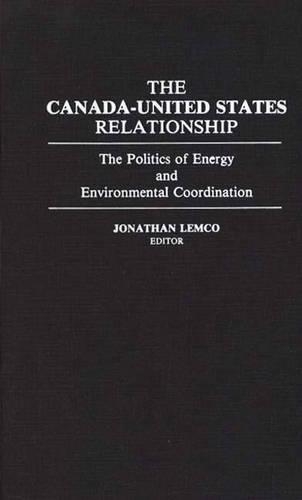
The Canada-United States Relationship: The Politics of Energy and Environmental Coordination
(Hardback)
Publishing Details
The Canada-United States Relationship: The Politics of Energy and Environmental Coordination
By (Author) Jonathan Lemco
Bloomsbury Publishing PLC
Praeger Publishers Inc
21st July 1992
United States
Classifications
Tertiary Education
Non Fiction
Energy industries and utilities
Central / national / federal government policies
333.79
Physical Properties
Hardback
240
Description
This book investigates the role of governmental and non-governmental actors in energy-environment decision making. An examination of the trade-offs between various energy options which are currently before policymakers in both Canada and the United States focuses on the environmental and economic consequences of public and private choices which face leaders in both countries as well. Whether the existing regulatory environment will prove feasible and/or desirable under the new Canada United States Free Trade Agreement is also discussed. Some of the questions the authors explore include: How do we assign costs and benefits to alternative energy strategies without underestimating the importance of environmental factors What types of regulatory regimes should both countries strive for in order to foster a good balance between environmental protection and economic growth What kinds of political processes should be instituted to allow for more effective energy/environmental policy choices in both countries This book should prove of interest to students and scholars concerned with the environment and interested in Canada-United States relations.
Reviews
Basically this is a comparative analysis of two neighboring countries' individual approaches to and joint involvement in environmental protection activities. The ten chapters are authored mostly by academic political scientists or economists closely identified with environmental concerns. In Ch. 1, the editor introduces the topic and summarizes each essay's contribution. Some essays add considerably to our knowledge of Canadian-American relations, especially Ch. 3 (energy policy and federalism in the two countries) and Ch. 5 (environment, free trade, and Canada-US relations). Other chapters explore the continental environment/energy interface (Ch. 4, 7, and 10) and the role of interest groups as they bring their efforts to bear on governmental action in the field (Ch. 6). Chapters vary in length and technicality, and each contains copious endnotes. There is no final summarizing essay or any interconnecting transitional sections to tie the essays together. Selected bibliography. A useful resource as policy developments unfold in these areas in the years ahead. Advanced undergraduate through professional.-Choice
"Basically this is a comparative analysis of two neighboring countries' individual approaches to and joint involvement in environmental protection activities. The ten chapters are authored mostly by academic political scientists or economists closely identified with environmental concerns. In Ch. 1, the editor introduces the topic and summarizes each essay's contribution. Some essays add considerably to our knowledge of Canadian-American relations, especially Ch. 3 (energy policy and federalism in the two countries) and Ch. 5 (environment, free trade, and Canada-US relations). Other chapters explore the continental environment/energy interface (Ch. 4, 7, and 10) and the role of interest groups as they bring their efforts to bear on governmental action in the field (Ch. 6). Chapters vary in length and technicality, and each contains copious endnotes. There is no final summarizing essay or any interconnecting transitional sections to tie the essays together. Selected bibliography. A useful resource as policy developments unfold in these areas in the years ahead. Advanced undergraduate through professional."-Choice
Author Bio
JONATHAN LEMCO is a Senior Fellow at the National Planning Association and Adjunct Professor of Canadian Politics at The Paul Nitze School of Advanced International Studies of The Johns Hopkins University. His recent books include Canada and the Crisis in Central America (Praeger, 1991), Political Stability in Federal Governments (Praeger, 1991), and The Canada-United States Relationship (Praeger, 1992, forthcoming).
